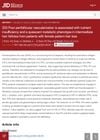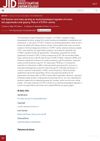 98 citations,
October 2012 in “Dermatologic Clinics”
98 citations,
October 2012 in “Dermatologic Clinics” Eating the right nutrients can improve hair health, but taking extra supplements usually doesn't help unless you have a deficiency.
 7 citations,
January 2022 in “Animal Reproduction”
7 citations,
January 2022 in “Animal Reproduction” Using rodents for research shows that health problems in the womb can cause diseases later in life.
 1 citations,
May 2022 in “IntechOpen eBooks”
1 citations,
May 2022 in “IntechOpen eBooks” Obesity leads to physical, metabolic, reproductive issues, higher healthcare costs, and mental health problems.
 43 citations,
October 2019 in “Pediatric Research”
43 citations,
October 2019 in “Pediatric Research” Lifestyle changes are the main treatment for PCOS, which is a complex condition requiring early management to reduce its health impacts.
 3 citations,
January 2020 in “Plastic and Aesthetic Research”
3 citations,
January 2020 in “Plastic and Aesthetic Research” Non-surgical procedures can help reduce wrinkles and stimulate skin repair by understanding skin aging at the molecular level.
 138 citations,
July 2015 in “Clinical, Cosmetic and Investigational Dermatology”
138 citations,
July 2015 in “Clinical, Cosmetic and Investigational Dermatology” Eating less sugar, milk, and saturated fats and more vegetables and fish may help treat and prevent acne.
 77 citations,
July 2020 in “Journal of the European Academy of Dermatology and Venereology”
77 citations,
July 2020 in “Journal of the European Academy of Dermatology and Venereology” Environmental factors, hormones, nutrition, and stress all significantly affect skin health and aging.
 1341 citations,
January 2014 in “Cardiology Research and Practice”
1341 citations,
January 2014 in “Cardiology Research and Practice” Managing metabolic syndrome needs both lifestyle changes and medical treatments.
 1 citations,
June 2021 in “bioRxiv (Cold Spring Harbor Laboratory)”
1 citations,
June 2021 in “bioRxiv (Cold Spring Harbor Laboratory)” GTL1 is needed to control root hair growth and prevent problems when there are too many nutrients.
 January 2025 in “Nature Communications”
January 2025 in “Nature Communications” CPK1 helps root hair growth in Arabidopsis by activating channels for calcium signaling.
 295 citations,
September 2006 in “Cell Cycle”
295 citations,
September 2006 in “Cell Cycle” The conclusion is that using drugs to block the TOR pathway might slow aging and prevent age-related diseases.
 3 citations,
May 2018 in “Journal of nutritional health & food science”
3 citations,
May 2018 in “Journal of nutritional health & food science” Nutritional supplements can help manage hair loss and promote hair growth by strengthening hair roots and countering harmful effects of pollution, smoking, and deficiencies in vitamins and minerals.
 April 2024 in “bioRxiv (Cold Spring Harbor Laboratory)”
April 2024 in “bioRxiv (Cold Spring Harbor Laboratory)” A gene network led by RSL4 is crucial for early root hair growth in response to cold in Arabidopsis thaliana.
 71 citations,
November 2009 in “Best Practice & Research in Clinical Obstetrics & Gynaecology”
71 citations,
November 2009 in “Best Practice & Research in Clinical Obstetrics & Gynaecology” PCOS in teens is hard to diagnose, linked to genetics and lifestyle, and managed with weight loss and medication.
 June 2015 in “Journal of the turkish academy of dermatology”
June 2015 in “Journal of the turkish academy of dermatology” Eating the right foods is important for skin health and can help treat some skin conditions.
 34 citations,
March 2001 in “Cleveland Clinic Journal of Medicine”
34 citations,
March 2001 in “Cleveland Clinic Journal of Medicine” Manage hair shedding by identifying triggers, possibly using supplements or medications, and tracking with a health calendar.
 5 citations,
March 2020 in “Current Opinion in Endocrine and Metabolic Research”
5 citations,
March 2020 in “Current Opinion in Endocrine and Metabolic Research” Skin problems in PCOS, like excess hair, acne, and hair loss, may not always indicate high male hormone levels and need careful diagnosis for proper treatment.
 October 2021 in “Journal of Investigative Dermatology”
October 2021 in “Journal of Investigative Dermatology” Poor blood supply in hair follicles is linked to nutrient deficiency in patients with female pattern hair loss, and adding more nutrients could potentially fix this.
 9 citations,
July 1995 in “Veterinary Clinics of North America: Small Animal Practice”
9 citations,
July 1995 in “Veterinary Clinics of North America: Small Animal Practice” The document concludes that hair loss in cats is caused by various factors, including allergies, mites, infections, and hormonal issues, with treatments varying accordingly.
 November 2022 in “Journal of Investigative Dermatology”
November 2022 in “Journal of Investigative Dermatology” Blocking mTORC1 activity could increase hair pigmentation and potentially reverse greying.
 6 citations,
July 2003 in “Journal of Womens Health”
6 citations,
July 2003 in “Journal of Womens Health” Experts say proper treatment and sensitivity are important for women's facial skin issues like acne and unwanted hair.
 6 citations,
January 2020 in “Postepy Dermatologii I Alergologii”
6 citations,
January 2020 in “Postepy Dermatologii I Alergologii” Check and treat low iron and vitamin D levels in people with hair loss.
 March 2023 in “International Journal of Biomedicine”
March 2023 in “International Journal of Biomedicine” Hair loss from Telogen Effluvium can be managed by treating the underlying cause and may improve with treatments like minoxidil.
 79 citations,
January 2017 in “Dermatology practical & conceptual”
79 citations,
January 2017 in “Dermatology practical & conceptual” Correcting nutrient deficiencies may help with hair loss, but the benefits of supplements without a deficiency are uncertain and could be harmful.
 December 2023 in “Frontiers in microbiology”
December 2023 in “Frontiers in microbiology” Mannan oligosaccharides improve raccoon dogs' fur quality and overall health.
 October 2023 in “Frontiers in endocrinology”
October 2023 in “Frontiers in endocrinology” Effective PCOS treatments require targeting specific signaling pathways.
 4 citations,
January 2022 in “Open Health”
4 citations,
January 2022 in “Open Health” Eating healthy, exercising, and changing behaviors are the best first steps to treat Polycystic Ovary Syndrome (PCOS).
 November 2023 in “Journal of plant nutrition and soil science”
November 2023 in “Journal of plant nutrition and soil science” Boron deficiency in maize affects leaf boron levels and nutrient uptake differently depending on root hair presence and soil type.
 49 citations,
February 2019 in “The Journal of Clinical Endocrinology and Metabolism”
49 citations,
February 2019 in “The Journal of Clinical Endocrinology and Metabolism” Use "female pattern hair loss" term, assess androgen excess, treat with minoxidil and other medications if needed.

Eating healthy, exercising, and certain nutrients like myoinositol and omega-3s can help manage PCOS symptoms.






























